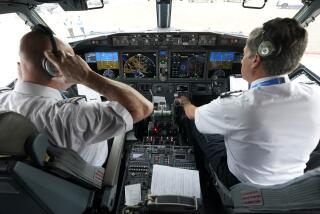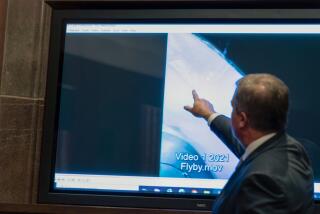NASA: Astronauts didn’t fly drunk
- Share via
NASA said Wednesday that it had found no evidence that any of its astronauts ever flew while inebriated, or even showed up for work impaired, as was recently alleged by an outside investigative panel.
In particular, Administrator Michael D. Griffin said a sensational account of an unnamed astronaut flying drunk on a Russian Soyuz flight was false.
“I’m saying I think our guys are doing a heck of a job, and these allegations are untrue,” Griffin said at a briefing in Washington.
Griffin’s remarks came with the release of a 45-page internal review of the much-publicized allegations, made last month by a panel that criticized the culture of NASA’s astronaut corps in the wake of the Lisa Marie Nowak case.
Nowak, a space shuttle astronaut, was arrested this year in Orlando, Fla., and accused of stalking and attacking a rival for the affections of a male astronaut. This week she announced plans to mount an insanity defense.
As a result of Nowak’s arrest, Griffin asked an outside panel to look into astronaut health and safety issues to see whether NASA should be doing more to make sure its astronauts were not going into space suffering from debilitating mental or physical problems.
The panel, citing anonymous reports, identified “some episodes of heavy use of alcohol by astronauts in the immediate preflight period.”
The report cited two instances of alcohol abuse before flights, one in Kazakhstan in central Asia.
The report issued Wednesday was directed by NASA safety officer Bryan O’Connor, who said he reviewed tens of thousands of pages of documents and consulted scores of former and current astronauts and flight surgeons going back 20 years.
“I was unable to verify any case in which an astronaut spaceflight crew member was impaired on launch,” O’Connor said in the report. Neither could he find a case in which a manager disregarded warnings from another NASA employee that an astronaut should not be allowed to fly.
Twenty flight surgeons signed an e-mail to O’Connor saying they had never seen an astronaut drunk before a launch or a flight on a training jet.
O’Connor’s review included an inspection of crew quarters in Houston and Cape Canaveral in Florida before the launch of the shuttle Endeavour this month, when the seven astronaut crew members were in quarantine.
He found a half-empty bottle of tequila in a cupboard. Beer and wine are sometimes brought in by nonflying astronauts, he said.
On the whole, however, alcohol consumption today by astronauts seems to be less common than in previous decades, he said. He said a far higher percentage of astronauts were teetotalers than ever before.
As for accounts of drinking on the run-up to a flight, he said “the lack of privacy on launch day makes it nearly impossible to hide alcohol use or alcohol-induced impairment.”
O’Connor’s report does recommend that NASA flight surgeons take a stronger role on the day of a launch by accompanying astronauts as they suit up. He also said NASA should look at instituting routine drug and alcohol testing for all employees, including astronauts.
O’Connor said he shared his failure to confirm the alcohol abuse reports with the panel that first aired them. Those panel members provided some additional details but did not reveal the names of the NASA employees who initially reported the improper alcohol use, O’Connor said. The employees involved had asked for anonymity.
Griffin said he couldn’t state categorically that no astronaut ever drank to excess before launch. “I can’t prove a negative,” he said.
All he could be sure of, he said, was that the specific anecdotes aired by the panel were untrue and that every attempt by O’Connor to find any other incidents had proved futile.
The report by the outside panel was the latest in recent years to take aim at NASA’s culture.
Investigators looking into the Columbia shuttle accident in 2003 charged that lower-level employees feared raising safety concerns out of concern that it could damage their careers.
Columbia investigators also said NASA managers let schedule pressures take precedence over safety.
Griffin said that if there once was a launch-first-and-worry-later culture at NASA, the agency’s efforts to reinvent itself since Columbia had succeeded in changing it.
“I don’t think that exists anymore,” he said.
--
More to Read
Sign up for Essential California
The most important California stories and recommendations in your inbox every morning.
You may occasionally receive promotional content from the Los Angeles Times.













